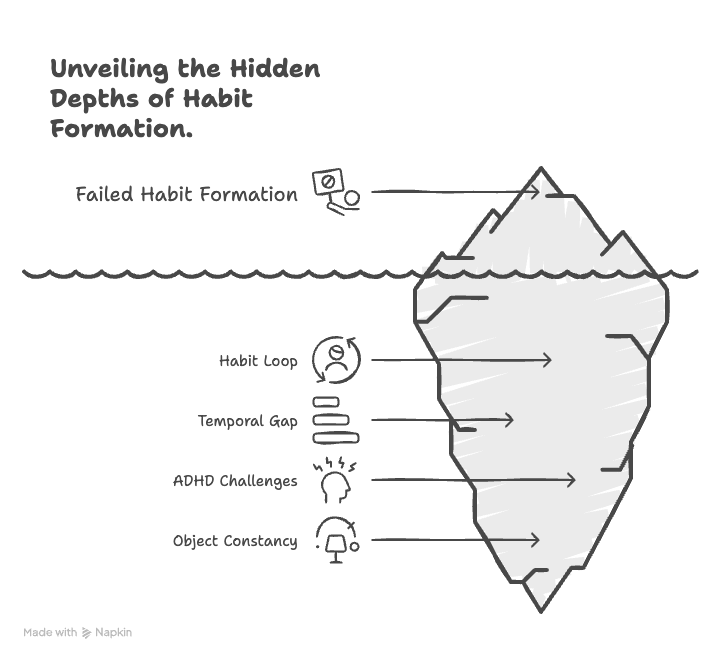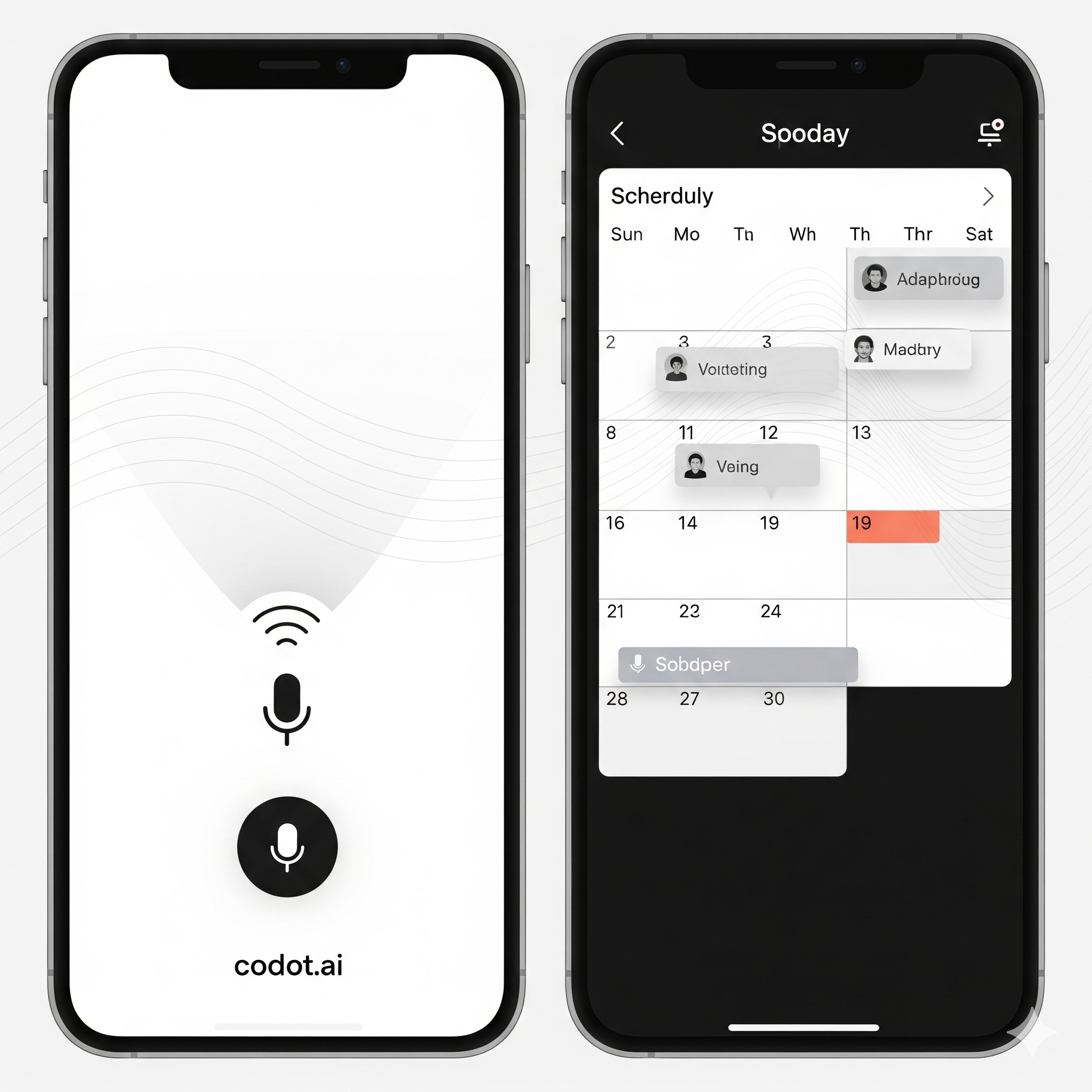Introduction: The Paradox of Habit Trackers: Why Traditional Tools Fail You
Have you ever downloaded a habit tracker, set up a few goals, only to abandon them weeks later? If you’ve found yourself in this frustrating cycle, you’re not alone. Despite the booming market of digital habit-tracking tools, user abandonment rates remain staggeringly high. But here’s the twist: it’s not your willpower at fault—it’s the design of these tools.
In this post, we’ll explore why conventional habit trackers fail and introduce you to Codot AI, the voice-based, dynamic productivity assistant that’s changing the game. With its intuitive, hands-free approach to building and maintaining habits, Codot AI redefines the way we think about productivity.
The Cognitive Disconnect: Why Habit Trackers Fail to Align with Human Behavior
Before we dive into the details of Codot AI, it’s essential to understand the cognitive and psychological reasons why traditional habit trackers often fall short.
The Habit Loop: A Neuroscientific Breakdown
At the heart of every habit is the habit loop, a three-step cycle: Cue, Routine, and Reward. The Cue triggers a behavior, the Routine is the action taken, and the Reward reinforces the behavior with dopamine. The problem arises with habits that don’t offer immediate rewards, such as exercise or healthy eating. This creates a temporal gap, making it harder for the brain to stay motivated without that instant dopamine boost.
For individuals with Attention-Deficit/Hyperactivity Disorder (ADHD) or executive function challenges, this becomes even more difficult. Low dopamine levels in the brain mean that these individuals struggle to stay motivated, especially for routines that aren’t inherently stimulating. In short, the issue isn’t laziness—it’s a neurological difference.
The “Out of Sight, Out of Mind” Phenomenon
Another barrier to habit formation is object constancy, or the inability to keep a task in your mind without constant reminders. Traditional habit apps often fail here. Most require you to open the app, navigate to your task, and manually log progress—an extra mental task that users often forget, especially those with attention deficits.

Why Current Habit Trackers Fail: A Critical Look
Now that we understand the cognitive challenges, let’s take a closer look at why traditional habit trackers don’t work.
The Problem with Streaks: Guilt Over Growth
Many habit-tracking apps rely on streaks to motivate users. But the problem is that if you miss a day, your streak is broken, and this can lead to feelings of failure and guilt. For someone with ADHD or inconsistent motivation, the pressure to maintain a streak can be overwhelming, making the app feel like a burden rather than a helpful tool.
Manual Input: The Silent Barrier to Consistency
Most habit trackers require you to manually log your progress. But for users who struggle with working memory or attention, this creates mental friction. The act of remembering to log a task itself becomes another habit to manage.
Data Without Context: The “Black Box” Problem
While some apps provide detailed data, they fail to offer meaningful context. Seeing a graph that tells you when you missed journaling on Wednesdays doesn’t help you understand why you missed it. Without the contextual insight needed for behavior change, users feel lost and disengaged.
Introducing Codot AI: The Next Evolution in Habit Tracking
Codot AI takes a radically different approach to habit-building. Instead of simply being another tracker, Codot AI is a voice-first platform that helps you organize your life—without the cognitive load of traditional tools.

A Voice-Based Approach: Eliminating Mental Overhead
With Codot AI, you simply speak your tasks, and the AI schedules them for you. No more manually entering tasks into an app. The voice-first interface minimizes friction, allowing you to seamlessly integrate task management into your day-to-day routine. This is especially beneficial for individuals who struggle with the traditional manual input of habit trackers.
Dynamic Scheduling: No More “Out of Sight, Out of Mind”
Codot AI offers smart scheduling that adapts to your needs. You don’t have to manually log tasks. Instead, you speak your task (e.g., “Write a report next Monday at 3 PM”), and Codot AI automatically finds the best time to schedule it. This dynamic scheduling serves as a constant reminder, keeping your tasks in the forefront of your mind, and solving the object constancy problem.
Codot AI: Building Habits Without the Pressure of Perfection
One of the most unique aspects of Codot AI is its approach to habit consistency. Rather than focusing on streaks or perfection, Codot AI fosters growth without guilt.
The Guilt-Free Framework
Codot AI is designed to help you build habits by working with your natural rhythm, not against it. If you miss a task, Codot AI doesn’t punish you with broken streaks or guilt. Instead, it adapts to your behavior, providing gentle reminders and celebrating progress—no matter how small. This adaptive learning model ensures that you stay on track without the psychological burden of perfection.
Why Codot AI Stands Out: Competitive Advantage
Let’s compare Codot AI to traditional habit trackers to understand why it’s the superior solution for habit-building.
| Feature / Philosophy | Codot AI | Gamified (e.g., Habitica) | Streak-Based (e.g., Streaks) | Data-Centric (e.g., Way of Life) |
|---|---|---|---|---|
| Interaction Model | Voice/NLP | Manual/Tap-based | Manual/Tap-based | Manual/Tap-based |
| Motivational Model | Guilt-Free/Adaptive | Gamified/Punishment | Streak-based/All-or-Nothing | Data-Driven/Minimalist |
| Scheduling | Dynamic AI-driven | Static/Manual | Static/Manual | Static/Manual |
| Cognitive Load | Low | High | Low | Low |
| Flexibility | High | High/Customizable | Low/Daily-focused | High/Journaling-based |
| Contextual Intelligence | Yes (e.g., reminders) | No | No | No |
As you can see, Codot AI excels in areas where traditional habit trackers falter. Its adaptive, low-friction approach positions it as the ultimate tool for users seeking long-term consistency without the guilt or cognitive load of traditional methods.
Conclusion: Build Your Life, Effortlessly with Codot AI
Traditional habit trackers focus on tracking—Codot AI focuses on building a life. With its voice-based, dynamic scheduling system and guilt-free framework, Codot AI is more than just a habit tracker; it’s a foundational life-organizing tool designed to work with your brain, not against it.
Ready to break free from the burden of traditional habit trackers? Try Codot AI today and experience a seamless, low-friction approach to building habits that actually stick. No more streaks, no more guilt—just effortless progress.
Ready to Build Your Habits?
Start using Codot AI today and make habit-building effortless with voice-first productivity.
Start Your Free TrialFrequently Asked Questions (FAQs)
1. What is Codot AI?
Codot AI is a voice-first productivity assistant designed to help you build and maintain habits effortlessly. Unlike traditional habit trackers that require manual input, Codot AI uses natural language processing to schedule tasks, send reminders, and help you stay on top of your goals without the mental load.
2. How is Codot AI different from traditional habit trackers?
Traditional habit trackers often rely on manual data entry, streaks, and static systems, which can add cognitive load and lead to burnout. Codot AI, on the other hand, eliminates manual input by allowing you to speak your tasks and letting the AI handle the scheduling. It also uses a guilt-free framework, removing the pressure of streaks and focusing on gradual, adaptive growth.
3. Can Codot AI help people with ADHD or executive function challenges?
Yes, Codot AI is designed with neurodivergent users in mind. It addresses common challenges like object constancy and working memory by actively managing tasks and providing dynamic, context-aware reminders. Its voice-first approach reduces cognitive load, making it easier for individuals with ADHD to stay organized and productive.
4. Does Codot AI require a lot of setup or learning?
No, Codot AI is designed to be as user-friendly as possible. The setup is simple, and you can start interacting with the AI immediately through voice commands. The system learns your habits over time, offering personalized suggestions and reminders based on your preferences.
5. How does Codot AI handle missed tasks?
Unlike traditional habit trackers that punish missed tasks with broken streaks, Codot AI takes a guilt-free approach. If you miss a task, Codot AI adapts and offers gentle reminders. It doesn’t focus on perfection but on consistent improvement, helping you get back on track without feeling like a failure.
6. Can I integrate Codot AI with other apps or devices?
Yes! Codot AI is designed to integrate seamlessly with other ecosystems and devices, such as Google Calendar and Apple Health, to further automate task tracking and habit management. You can connect these platforms to reduce manual input and enhance your experience.
7. How does Codot AI help me stay consistent with my habits?
Codot AI fosters consistency without pressure. By offering dynamic scheduling, contextual reminders, and adaptive learning, it makes habit-building effortless. The AI learns your rhythm and adjusts to fit your needs, helping you stick to your habits even if your motivation fluctuates.
8. Is Codot AI suitable for users with executive dysfunction or low motivation?
Absolutely. Codot AI is designed for individuals who have struggled with traditional habit trackers due to executive dysfunction or fluctuating motivation. By eliminating the need for manual data entry and focusing on adaptive scheduling and reminders, Codot AI reduces friction and provides a supportive framework for building lasting habits.
9. Can I try Codot AI before committing?
Yes, Codot AI offers a free trial so you can experience its full range of features before deciding to commit. We encourage users to try it out and see how it transforms their habit-building process.
10. How does Codot AI help with motivation?
Instead of relying on streaks or gamification, Codot AI provides gentle check-ins and growth celebrations, reinforcing progress without focusing on perfection. The AI adapts to your behavior and provides reminders that feel natural and supportive, boosting motivation over time.